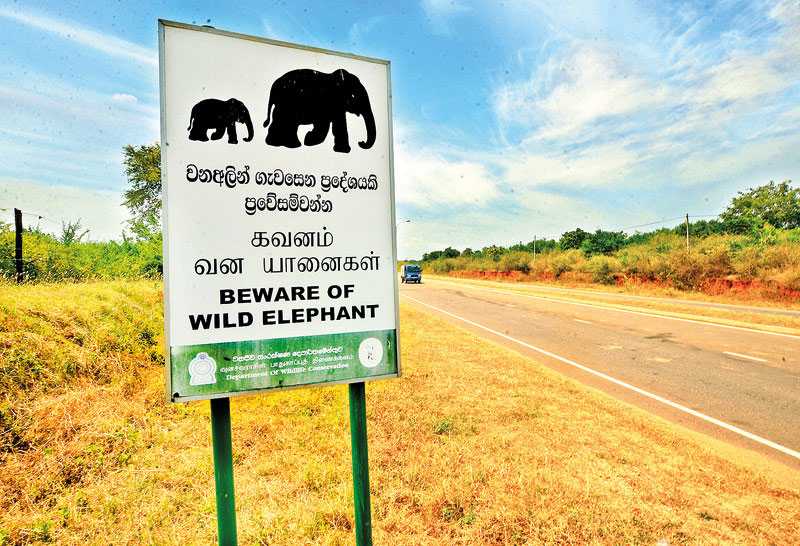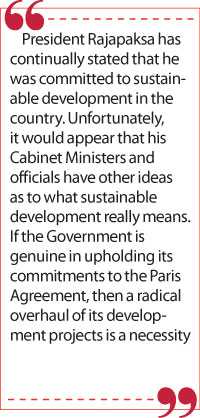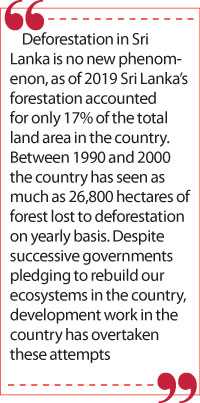Monday Feb 16, 2026
Monday Feb 16, 2026
Thursday, 12 November 2020 00:30 - - {{hitsCtrl.values.hits}}

Experts have already proven that the ongoing deforestation and unchecked urbanisation is the cause of the human-elephant conflict – Pic by Shehan Gunasekara
 Climate change, and global warming in particular, have been key topics of discussion on the global stage in the past several years. In 2020, with the entire global population facing the COVID-19 pandemic, attention has turned to the environment and what we as the human race can do to reverse the trend it has taken on.
Climate change, and global warming in particular, have been key topics of discussion on the global stage in the past several years. In 2020, with the entire global population facing the COVID-19 pandemic, attention has turned to the environment and what we as the human race can do to reverse the trend it has taken on.
Donald Trump’s presidency has come with its fair share of controversy, and one of the main topics which raised a collective groan from the world was his decision to withdraw the United States of America from the Paris Agreement. So unpopular was his decision that just a few hours after Joe Biden’s victory was announced, the President-Elect tweeted that upon assuming office in January 2021 the US would once again re-join the Paris Agreement.
For those who are uncertain what this agreement entails, it has bound together nations from all over the world to the common goal of combating climate change through a variety of initiatives. A sizeable task lies ahead for the global community, and certainly America’s decision to withdraw was a setback. Biden’s pledge to rejoin the efforts will go a long way in once again reassuring the rest of the world that the super-powers are committed to the task at hand.
In Sri Lanka climate change has not been a topic of discussion beyond a small group of citizens. Despite having been an original signatory of the agreement back in 2016, the country has failed to make any meaningful strides forward in their efforts.
One of the platforms that saw Gotabaya Rajapaksa elected as President in 2019 was his promise to address concerns regarding the environment. Included in his pledge was increase forest cover in the country by 30%. However, the change in Government back in December 2019 has seen a complete disregard of the environment.
In July this year the Cabinet announced that the Ministry of Wildlife Resources and Forest Conservation would revoke circular 5/2001 and circular 2/2006. These circulars relates to the oversight of the Other State Forests (OSF), which account for over 330,000 hectares of forest land.
While many people have ignored the importance of these forested areas, it should be noted that over 100,000 hectares of this forested land is the site of the Human-Elephant Conflict. Any moves to cut down these forests will only serve to exacerbate the issue. Experts have already proven that the ongoing deforestation and unchecked urbanisation is the cause of the Human-Elephant Conflict.
Following opposition from environmentalists, this decision was temporarily suspended. However, earlier this week the Ministry of Wildlife and Forest Conservation went ahead and cancelled the circular. This will now see these forests no longer under the purview of the Forest Department, but instead handed over to the District and Divisional Secretariats.
 |
 |
Coupled with the Government’s promise to provide State land to those already occupying such plots as indicated through the publication of Extraordinary Gazette 2192/36 in September this year, questions are now being asked as to what plans the Government has for these OSFs.
Deforestation in Sri Lanka is no new phenomenon, as of 2019 Sri Lanka’s forestation accounted for only 17% of the total land area in the country. Between 1990 and 2000 the country has seen as much as 26,800 hectares of forest lost to deforestation on yearly basis. Despite successive governments pledging to rebuild our ecosystems in the country, development work in the country has overtaken these attempts.
The move to hand over the OSFs to local authorities will be a red flag to all environmentalists. A major barrier to the protection of the environment in Sri Lanka is the politicisation of deforestation in the country.
According to a report submitted to Parliament in September in regard to the unlawful clearing of the protected Anawilundawa Wetland, it was revealed that a brother of a State Minister who was also a former Local Government member was involved in this destruction.
With the removal of the OSFs from the purview of the Department of Forest Conservation, the question must be asked of the Government as to who will have the oversight over the decisions made by the District and Divisional Secretariats in regard to this land and whether or not these State employees will be supported in fending off political pressure.
Of course this is not the first instance of the Government choosing to discard the environment for supposed development projects.
Earlier this year the Sinharaja Rainforest, a UNESCO World Heritage Site, was the scene of grave controversy when construction began on a road which was to run through the forest reserve. Despite widespread opposition to the construction of this roadway, the President instructed his officials to complete the construction without damaging the environment. No clear indication has been given as to how this construction will proceed without harming the protected forest.
This is not the first time a government has attempted to build a road through this rainforest. Back in 2011, when President Gotabaya Rajapaksa’s brother, Mahinda Rajapaksa, was in office similar attempts were made. On that occasion construction was halted after UNESCO wrote to the Government asking for a clear environmental impact report on the forest.
In October the World Heritage Centre, in a statement, indicated that they would be communicating with the Government regarding the construction of the road, as they believed such a construction would pose a threat to the rainforest.
Whether this will yield a halt in the construction remains to be seen, however, the blatant disregard by the authorities to previous concerns raised by UNESCO in regard to the rainforest does not bode well.
Of course the Rajapaksa Government’s development policies have not seen environmental damage only on a large scale. On Tuesday (10) it was announced that the Cabinet had approved the construction of a bridge over the Rajagiriya-Nawala canal, connecting Nawala to Ethul Kotte. This project was first recommended in May this year, during the COVID-19 lockdown.
Residents in the area have since been fighting to have this project stopped, complaining that such an initiative would see large-scale destruction to the natural environment along the Nawala marsh. According to the residents in the area, following their meetings with the President’s Secretary and the Road Development Authority no relevant environmental impact assessment reports could be produced.
As to why the Government has felt it necessary to hastily approve the construction of such a bridge, and apparently without the proper studies being carried out, raises many questions.
President Rajapaksa has continually stated that he was committed to sustainable development in the country. Unfortunately, it would appear that his Cabinet Ministers and officials have other ideas as to what sustainable development really means. If the Government is genuine in upholding its commitments to the Paris Agreement, then a radical overhaul of its development projects is a necessity.